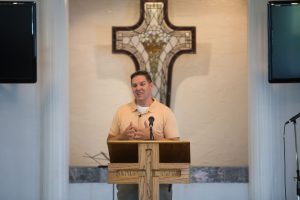Christians face harassment in more countries than any other religious group, and most harassment takes place in Christian-majority countries, according to the Pew Research Center.
This comes as part of a global trend of increasing religious harassment, particularly for Muslims in Europe.

Christians make up a majority of the U.S. population at 70.6 percent. In Utah, the rate is just higher than the national average, with 73 percent of the adult population identifying as Christian in 2015, according to the Pew Research Center.
BYU law professor Elizabeth Clark said despite America’s legacy as an advocate and global role model for religious freedom, Christians and people of other faiths in the U.S. are still harassed.
“I think that religious beliefs are often at the core of individuals’ identity and meaning, and thus religion will likely remain a source of significant disagreement among many,” Clark said. “I think that religious discrimination still happens.”
Clark said religious persecution is deeply harmful because it can destabilize a country through increased violence and social hostilities. Religious freedom, on the other hand, is correlated with increased political and civil rights, economic growth and education for women and reduced amount of GDP spent on military and other social goods, Clark said.
Pastor Russ Robinson of Provo’s First Baptist Church said he feels Christian marginalization in the United States is connected to the rise of secularism in American society.
“I think the fact that our nation is becoming increasingly secular and secular progressive overall, also very pluralistic, relativistic in their worldview, is ultimately where the marginalization comes,” Robinson said.

BYU communications professor Mark Callister said a prevalent form of Christian harassment in the United States is through the media, particularly in movies.
Callister said Christians are often portrayed as fanatics, hypocrites or naive or insensitive. He said these portrayals are detrimental not only for Christians themselves, but for other religions as well.
“Young audiences who are still in those formative years of creating their own perceptions and attitudes for groups of people may become particularly vulnerable to those message patterns and as a result may feel that religion is not something that would be of value to them,” Callister said.
However, a 2017 Pew Research Center study found Americans express more positive feelings toward religious groups than they have in the past.
Emma Finch, a BYU senior majoring in exercise and wellness, said she thinks social media has also become a tool for religious harassment, and has seen many of her Christians friends harassed online for their beliefs.
“Growing up, I’ve definitely seen a lot of persecution towards many very strong Christian friends,” Finch said. “I think because social media is such a powerful tool for expressing our ideas and our opinions … it’s pretty obvious when they’re persecuted.”
BYU golfer Alexandra White, a Christian, said she thinks society has grown to have an issue with Christianity because of the judgment that exists between different Christian groups themselves.
“We each believe that we have it right, and it takes the focus off of Christ and puts it on our beliefs,” White said. “It’s not supposed to be a system of beliefs. It’s supposed to be a relationship where Christ is leading us and guiding us and showing us the way.”
Robinson said he’s experienced marginalization for being an Evangelical Christian in Utah, where the majority of the population is Mormon.
He said the two most common issues he sees in Utah are people not taking Evangelicals seriously because they’re a minority and judgment against Christians who have left the LDS Church.
However, Robinson said he thinks attitudes toward different Christian groups are changing as Utah’s population grows and becomes more diverse.

He said the best thing Christians can do to eliminate harassment and marginalization of each other is to create an open and honest dialogue about what makes them different.
“That opens the door to much greater in-depth, honest, respectful and friendly dialogue,” Robinson said.
White said the best thing Christians can do when faced with harassment is choose to react in a positive way while still respecting others.
“We’re supposed to be loving each other whether we believe in Christ or not,” White said. “Whether we believe in Christ differently or not, it doesn’t matter. We’re supposed to focus on Christ and express the love that he shared.”





